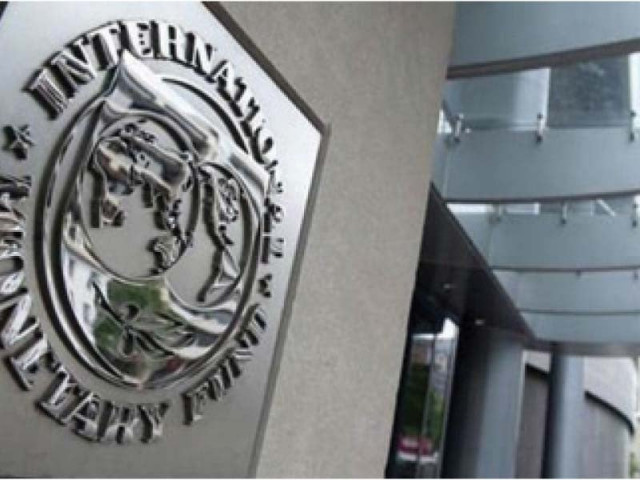Islamabad baffled by IMF moving goalposts
Pakistan reaches out to US to secure desperately-needed deal

Pakistan on Tuesday once again sought the US help to conclude a desperately-needed deal with the International Monetary Fund (IMF).
It is “rare” that despite implementing tough decisions with high political cost, the coalition government has to deal with a situation where the global lender keeps changing the goalposts constantly.
The request for the US help was made by Finance Minister Ishaq Dar in a virtual meeting with US Deputy Secretary of Treasury Wally Adeyemo, according to the government sources.
The US made the contact to discuss a different matter, the sources said and added Dar, however, brought the issue of the IMF attitude towards Pakistan with the official.
The finance ministry sources said the staff level agreement with the IMF was unlikely this week, as the two sides still have difference of opinion on major issues like the exchange rate, interest rate, external financing gap and Rs3.82 per unit debt servicing surcharge on electricity. In spite of all this, they hope to sort out the issues and clinch a deal next week.
The government has faced this unusual situation for the first time in the past 25 years where during almost every interaction, the IMF had come up with a different demand, they added.
The 9th review talks for the release of $1.1 billion tranche began a month ago and the delay is causing a heavy damage to the country, with a latest blow by Moody's that further lowered the credit rating to CCC. Regional countries, with the exception of China, too, are largely siding with the IMF, further complicating the situation.
Road barriers to IMF agreement
The sources said that the IMF has projected the external financing gap at $7 billion compared to $5 billion being worked out by the Ministry of Finance. In order to end the difference, the Pakistani authorities have requested the IMF to lower the deficit projection by $1 billion.
“Another $1 billion can be lowered by reducing the foreign exchange reserves building requirements,” the sources said.
“The IMF has projected the annual current account deficit at $8.2 billion for the current fiscal year despite it having only $3.7 billion during the first seven months,” said the sources. “In order to resolve the issue, it can reduce the projection by $1 billion,” they added.
The government hoped that it could still fetch $7 billion by June provided the IMF showed some flexibility in its position. “We are hopeful of increase in the gross official foreign exchange reserves to over $10 billion by June,” according to the government officials engaged in talks with the IMF.
However, the IMF has not accepted Pakistan’s stance on the external financing gap yet. Despite this, Pakistan is still hoped that it will be able to get $2 billion from Saudi Arabia and $1 billion from the United Arab Emirates in additional loans to bridge the gap. Also, it is eying $2 billion from the sale of assets to these nations, although the Gulf countries have not been fully cooperating.
The Pakistani authorities were appreciative of the Chinese help that has already disbursed $700 million. Another $1.3 billion Chinese loan will come in three tranches, providing a cushion at a time when the IMF was “unreasonable” in its demands, said the sources.
The sources said that the government had left the exchange rate at the mercy of market forces and as a result, the rupee-dollar value significantly changed against the last month's level of Rs230 to a dollar.
However, the IMF was still expressing apprehensions that the government was manipulating the price. “The IMF sees the exchange rate close to the grey market rate,” the sources said and added “This is not true.”
“We have explained our position but the IMF somehow does not understand it,” said the sources.
Both sides also have different views on the yardstick with which to measure the real interest rate – the gap between inflation and the central bank-determined interest rate.
The IMF did not accept the government’s position to calculate the real positive interest rate by gauging it against core inflation – being calculated after excluding energy and food inflation. It asked Pakistan to measure the real positive interest rate against the headline inflation. The IMF has already brought forward the monetary policy committee meeting date by two weeks to secure a big interest rate hike ahead of the staff level agreement.
In its monthly economic outlook report, the finance ministry said that “inflation will remain around 28% to 30% in the coming months due to the currency depreciation, recent rise in the energy prices and increase in the administered prices”.
At this headline inflation rate, the real interest rate will be negative by 13%. At the core inflation rate, which is around 19%, the real interest rate will be slightly positive after the upcoming hike.
“Pressuring Pakistan into adjusting the interest rates to the headline inflation is tantamount to forcing us to pay the price of global inflation too,” said the sources.
The ministry sources said that the IMF’s attitude towards Pakistan was unreasonable and it was pushing the authorities to take all measures before the staff level agreement, which in normal conditions are being taken after the staff level agreement but before the board meeting.
Pakistan has once again taken up the matter with the US – the key shareholder and often a force for softening or hardening the stance of the global lender
“The finance minister apprised him (the US deputy secretary) of the talks held with IMF mission on the 9th review and shared that as minister he had successfully completed the IMF programme in the past and that the government is committed to complete the present programme,” according to a statement issued by the finance ministry after the meeting.
The finance minister also apprised the US official on the economic priorities of the government to fix the economy to the right path while fulfilling its international obligations, it added.
Wally Adeyemo expressed the confidence in the policies and programmes of the government for economic and financial stability. He further extended his support and cooperation for sustainable economic development in Pakistan.
The sources said that the IMF’s demand to “permanently” impose debt servicing during the next fiscal year surcharge could not be justified.
The IMF programme is going to end in June and it is not understandable why the IMF was pushing Pakistan to take steps for a period when it will not be under the fund programme, said the sources.
They said that the government has already enforced the mini-budget worth Rs170 billion and also approved an increase in electricity and gas prices. Yet, the IMF was taking more than the usual time to conclude the staff level agreement, they added.


















COMMENTS
Comments are moderated and generally will be posted if they are on-topic and not abusive.
For more information, please see our Comments FAQ